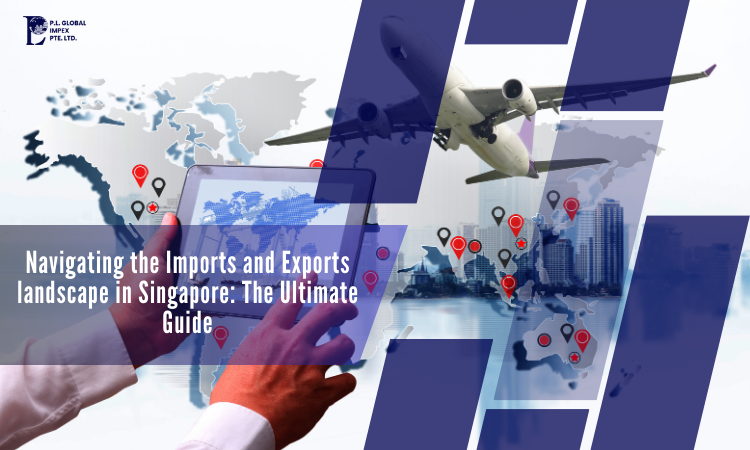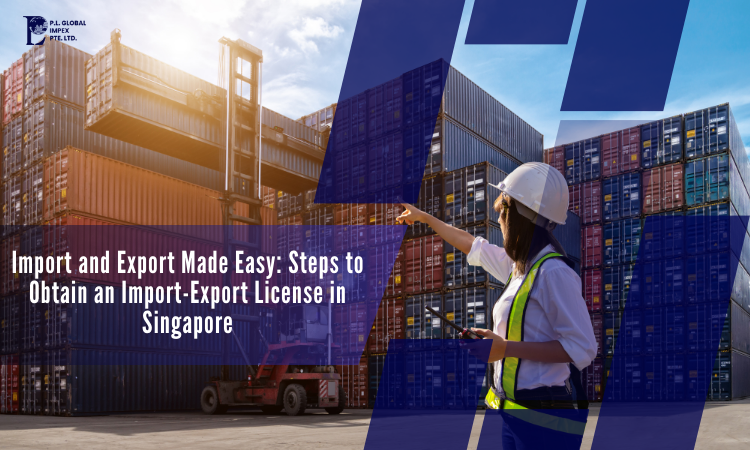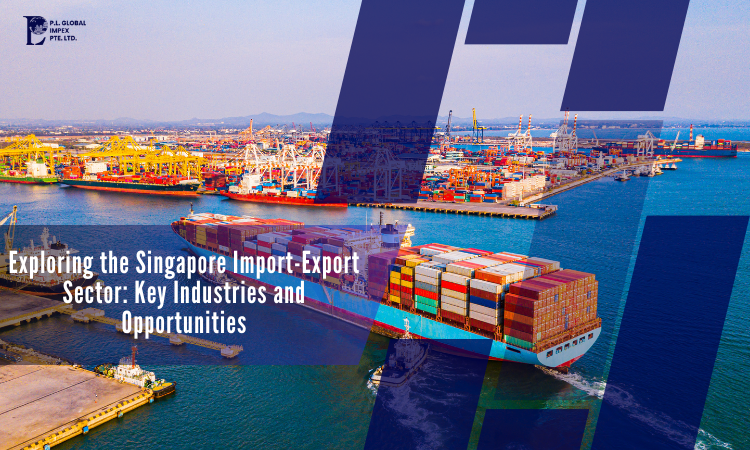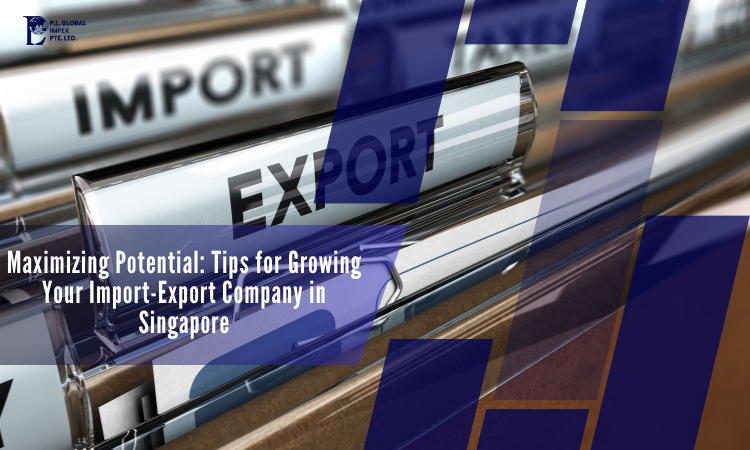Introduction:
Welcome to our comprehensive guide on the import-export business in Singapore! As an international trading powerhouse, Singapore offers a plethora of opportunities for entrepreneurs and businesses to thrive in the import-export sector. In this blog post, we will delve into the key aspects, regulations, and benefits of the import-export industry in Singapore. Whether you’re curious about obtaining an import and export license, or considering setting up an import-export company in Singapore, our guide aims to provide you with valuable insights to help you navigate through this thriving industry. Let’s get started!

1. Unlocking Success: How to Start an Import-Export Business in Singapore
The lion city roars with opportunity, and the world stage beckons. If you’re dreaming of launching an import-export business in Singapore, then hold onto your hat – a thrilling rollercoaster ride awaits! But before you dive headfirst into global trade, let’s unlock the secrets to a successful journey:
Chart Your Course:
Every journey starts with a map. Define your niche – will you export Singaporean-made goods or import coveted commodities? Research target markets, analyze competitor landscapes, and ensure your offerings fill a genuine gap. Remember, knowledge is your compass; use it wisely!
Navigate the Regulatory Seas:
Singapore prides itself on a streamlined administrative system, but paperwork still exists. Register your business with ACRA, activate your Customs account, and secure necessary licenses (import, export, or both). Don’t get lost in the regulatory maze; seek professional guidance if needed.
Forge Trading Alliances:
Building a network is your anchor in the global storm. Connect with reliable suppliers, international freight forwarders, and trustworthy financiers. Attend trade shows, participate in online forums, and leverage Singapore’s vibrant business community. Remember, collaboration keeps your ship afloat.
Master the Logistics Jargon:
Incoterms, customs declarations, and bills of lading can sound like a foreign language. Familiarize yourself with international trade terminologies and logistics processes. Understanding the lingo translates to smoother sailing on the trade winds.
Embrace Technology as Your Windward Sail:
Gone are the days of paper trails and fax machines. Utilize efficient trade management software to streamline operations, track shipments, and manage documentation. Technology is your digital compass, guiding you towards swift, cost-effective trade.
Diversify Your Cargo Hold:
Don’t put all your eggs in one basket. Spread your risk by diversifying your export and import markets and product lines. Remember, adaptability is your life jacket in the choppy waters of global trade.
Embrace the Learning Curve:
Global trade is a dynamic ocean, constantly evolving. Stay updated on market trends, regulations, and consumer preferences. Continuous learning is your life vest, keeping you afloat amidst ever-changing tides.
Weather the Storms with Patience:
Success rarely comes overnight. Building a thriving import-export business takes time, effort, and resilience. Don’t get discouraged by initial setbacks; learn from them and keep navigating forward. Remember, perseverance is your anchor, keeping you grounded and steady through turbulent times.

2. Navigating the Imports and Exports landscape in Singapore: The Ultimate Guide
Singapore, the Lion City, roars with the dynamism of global trade. But for aspiring import-export entrepreneurs, navigating its complex yet efficient system can feel like navigating a jungle. Fear not, intrepid pioneers! This ultimate guide equips you with the knowledge to plot your course through the jungle of permits, regulations, and logistics, and emerge with your import-export dreams roaring towards success.
Charting Your Course:
Singapore boasts a plethora of import-export companies who can be your compass. Consider their expertise, fees, and reputation before choosing your guide. Alternatively, if you crave independence, prepare to register your own company and activate your customs account. This grants you access to the TradeNet® platform, your key to import-export permits and declarations.
Permits and Licenses: Your Visa to Trade:
Before setting sail, ensure you have the right import and export license Singapore for your goods. For most non-controlled items, an IN Permit for imports and OUT Permit for exports suffice. Consult the TradeNet® guidelines for controlled items, which may require additional permits. Remember, ignorance is not bliss here – failing to comply can lead to hefty fines and delays.
Sailing Through Customs:
Singapore Customs, your gatekeeper to the trade jungle, requires comprehensive customs declarations for every shipment. Be meticulous and accurate, providing details like product descriptions, value, and country of origin. Partnering with a customs agent can ease this process, guiding you through the paperwork and regulations.
Logistics: Your Smooth Sailing Strategy:
Once permits are secured and declarations filed, it’s time to choose your vessel. Airfreight may be ideal for time-sensitive goods, while seafreight offers cost-effective bulk transport. Research reliable freight forwarders who understand your needs and budget. Remember, smooth logistics are the wind in your sails.
Staying Agile: Navigating the Currents:
The import-export landscape is dynamic, subject to changing regulations and trade agreements. Stay informed! Subscribe to government updates, attend industry events, and network with fellow traders. Adaptability is your lifejacket in this ever-shifting sea.
Resources are Your Anchor:
Numerous resources exist to guide you on your import-export journey. Utilize the Singapore Customs website, trade associations, and online forums to access valuable information, regulations, and support. Remember, knowledge is your anchor, keeping you from drifting off course.

3. Import and Export Made Easy: Steps to Obtain an Import-Export License in Singapore
The allure of international trade beckons, with possibilities as vast as the ocean itself. If you’re dreaming of launching an import-export business in Singapore, obtaining the right license is your first step towards setting sail. But fear not, aspiring entrepreneurs, for navigating the licensing waters is smoother than you might think!
Here’s your roadmap to securing your import-export license in Singapore:
Chart Your Course: Identify Your Needs:
Before setting sail, define your cargo. Are you importing or exporting controlled goods (like food, medical devices, or chemicals)? This will determine the specific license you need. The friendly folks at the Accounting and Corporate Regulatory Authority (ACRA) can help you chart the right course.
Register Your Vessel: Company Incorporation:
No ship sets sail without registration. Register your company with ACRA. It’s a quick and cost-effective process, and you’ll receive an approval letter – your official passport to the import-export world.
Raise the Jolly Roger: Activate Your Customs Account:
The Singapore Customs is your port of call. Head online and activate your company’s customs account. This grants you access to vital trade services and ensures smooth sailing through customs clearance.
Equip Your Ship: Apply for Permits and Licenses:
Now for the sails! Depending on your goods, you might need additional permits or licenses. The IN Permit allows imports, while the OUT Permit lets you export. For controlled goods, specific licenses exist, like the Food Import or Export License. Remember, ACRA and Singapore Customs are your trusty navigators – ask them for guidance.
Prepare for Inspection: Gather Documents:
Every ship needs manifest. Gather invoices, packing lists, bills of lading, and any relevant permits or licenses. These documents are your passport to smooth customs clearance, so ensure they’re accurate and complete.
Set Sail: Submit Your Application:
With all documents in hand, submit your application online or at the Singapore Customs office. They’ll meticulously review your paperwork and, if everything’s shipshape, grant you your coveted import-export license.

4. Exploring the Singapore Import-Export Sector: Key Industries and Opportunities
Singapore, the Lion City, roars with the power of global trade. Its bustling port, world-class infrastructure, and strategic location have forged it into a leading import-export hub, weaving its intricate threads into the tapestry of international commerce. But what are the key industries driving this economic dynamo, and what opportunities await potential players in the import-export game?
Electronics Whirlwind: Singapore hums with the symphony of the electronics industry. Semiconductors, integrated circuits, and computer parts dance through its import-export channels, making it a global leader in this high-tech domain. Opportunities flourish for those adept at navigating the ever-evolving landscape of microchips and motherboards.
Oil Refinery Symphony: Crude oil glistens as it arrives at Singapore’s shores, ready to be transformed into refined products that fuel the world. This strategic location and efficient refineries make Singapore a crucial player in the global energy game, offering fertile ground for those with a nose for the oil trade.
Chemical Alchemy: From life-saving pharmaceuticals to everyday plastics, Singapore’s chemical industry boils with innovation. Imports of raw materials feed this bustling sector, while finished products are exported to far-flung corners of the globe. The dance between chemicals and commerce offers exciting prospects for those with a grasp of this dynamic field.
Beyond Tangibles: Singapore’s import-export reach extends beyond physical goods. The city-state reigns supreme in the trade of intellectual property, from software and patents to trademarks and copyrights. This invisible trade weaves a complex web of knowledge and commerce, offering opportunities for those who understand the value of ideas in the digital age.
Emerging Melodies: Singapore’s entrepreneurial spirit keeps its import-export sector humming with new tunes. Bioengineering, medical technology, and sustainable solutions are gaining momentum, offering exciting avenues for those with an eye on the future.
But to join this harmonious concert, aspiring import-export players must master the instruments of the trade. Navigating regulations, understanding customs procedures, and forging strong international partnerships are all vital for success. Singapore’s robust support infrastructure, from government agencies to industry associations, can guide aspiring entrepreneurs through the intricate steps of this import-export waltz.

5. Maximizing Potential: Tips for Growing Your Import-Export Company in Singapore
Singapore, the global trade hub, beckons ambitious entrepreneurs with its seamless logistics, efficient infrastructure, and pro-business environment. But navigating the import-export industry, even in this prime location, requires strategic planning and savvy execution. So, whether you’re a budding tycoon or a seasoned trader, here are some tips to propel your import-export company in Singapore to new heights:
Niche Down, Shine Bright:
Don’t be a jack-of-all-trades; find your niche. Research trending markets, identify import-export gaps, and specialize in a specific product or sector. This focused approach allows you to build expertise, cultivate reliable partnerships, and stand out from the crowd.
License to Thrill:
Knowledge is power, and in Singapore’s import-export scene, licenses are key. Acquire the necessary permits and licenses for your chosen goods, whether it’s an IN Permit for imports or an OUT Permit for exports. Stay updated on regulations and proactively comply – legal hiccups can stifle growth.
Network, Collaborate, Conquer:
Singapore’s trade scene thrives on connections. Leverage trade associations, networking events, and government initiatives to forge partnerships with reliable suppliers, logistics companies, and potential clients. Collaborative ventures can open doors to new markets and economies of scale.
Embrace the Digital Wave:
Technology is your friend. Invest in robust online platforms to showcase your products, streamline communication with partners, and facilitate customs clearance processes. Consider E-commerce platforms like Alibaba or utilize trade portal services like Trade.gov to reach a wider audience.
Knowledge is Currency:
Stay abreast of market trends, trade policies, and competitor strategies. Attend industry seminars, subscribe to trade publications, and leverage market research data. The more informed you are, the better you can adapt to dynamic market conditions and capitalize on emerging opportunities.
Build Your Brand, Share Your Story:
In a competitive market, branding is everything. Craft a unique brand identity that reflects your company’s values and ethos. Utilize digital marketing tools to connect with your target audience and differentiate yourself from the competition. Building trust and brand recognition is crucial for sustainable growth.
Navigate the Numbers:
Financial acumen is vital. Implement robust accounting practices, closely monitor cash flow, and stay updated on exchange rates and trade finance options. Remember, profitability is the fuel that drives expansion.
Embrace Innovation, Stay Future-Focused:
Don’t get stuck in the traditional trade rut. Explore innovative practices like cross-border e-commerce, blockchain technology, and green logistics solutions. Embracing future-proof strategies will keep you ahead of the curve and ensure your business thrives in the evolving global trade landscape.
6. Exploring the Benefits of Setting Up an Import-Export Business in Singapore
In the bustling heart of Southeast Asia, where global trade winds whisper promises of prosperity, Singapore beckons with its siren song for enterprising souls. For those considering dipping their toes into the import-export business, this island nation offers a veritable treasure trove of advantages, ready to propel your venture towards success.
- A Gateway to Opportunity: Imagine a strategic crossroads, nestled amongst vibrant trade routes. Singapore boasts an unparalleled location, acting as a logistical hub for Asia and beyond. Its world-class ports and airfreight facilities streamline the movement of goods, opening doors to a vast network of international markets. Whether you dream of sourcing exquisite silk from Vietnam or exporting high-tech gadgets to Europe, Singapore’s connectivity puts the world at your fingertips.
- A Haven for Efficiency: Navigating the labyrinthine world of import-export regulations can be daunting. Yet, Singapore’s streamlined bureaucracy and transparent regulations offer a refreshing contrast. Trade regulations are clear, concise, and readily accessible, minimizing paperwork and delays. Additionally, Singapore’s renowned efficiency extends beyond paperwork, with its state-of-the-art infrastructure and digitalized processes ensuring swift movement of goods, allowing you to focus on what matters most – growing your business.
- A Magnet for Talent: Building a successful import-export business hinges on finding the right crew. Singapore, a melting pot of cultures and nationalities, attracts top-tier talent from across the globe. From logistics experts to market analysts, you’ll find a skilled and experienced workforce ready to navigate the complexities of international trade, bringing invaluable expertise to your team.
- A Nurturing Ecosystem: Launching a venture can feel like sailing into uncharted waters. But in Singapore, you’re not alone. The government actively supports import-export businesses through a plethora of initiatives. From financial incentives to comprehensive business programs, Singapore fosters an environment where your fledgling venture can flourish.
- A Stable Anchor: Imagine navigating stormy seas with unshakeable confidence. Singapore’s reputation for political stability and economic prowess offers a secure harbor for your import-export business. Sound fiscal policies and a transparent legal system create a climate where you can make informed decisions, plan for the future, and weather any potential economic storms with confidence.

7. Key Factors to Consider for a Successful Import-Export Venture in Singapore
The winds of opportunity whisper in the bustling port of Singapore, beckoning entrepreneurs to embark on daring ventures in the import-export arena. But navigating these turbulent waters requires keen planning and a map of essential considerations. So, before you set sail, ponder these key factors for a successful import-export voyage in Singapore:
Chart Your Course: Know Your Niche
Before casting your net, identify your target market. What goods will you import or export? Are you catering to a specific niche or a broader consumer base? Researching demand, competition, and regulations for your chosen products is crucial to charting a profitable course.
Secure Your Permit to Trade: Licenses and Registrations
Singapore operates with a meticulous regulatory system. Be prepared to navigate import and export licenses, depending on your chosen goods. Contact authorities like the Singapore Customs and the Accounting and Corporate Regulatory Authority (ACRA) to understand the specific permits and registrations required for your venture.
Find Your Seaworthy Vessel: Choosing the Right Partner
Building a strong supplier network is your anchor in the storm of international trade. Look for reliable partners with a proven track record in your chosen market. Consider factors like price, quality, and timely delivery to ensure smooth logistics and satisfied customers.
Weather the Financial Storm: Funding and Risk Management
Capital is your fuel, and managing it wisely is essential. Develop a comprehensive budget considering initial investments, operational costs, and potential risks. Explore financing options like loans or grants, and implement risk management strategies like insurance and market diversification to safeguard your venture.
Navigate the Digital Currents: Embracing Technology
In today’s digital age, technology is your compass. Utilize online platforms to connect with suppliers, manage logistics, and track shipments. Invest in robust accounting software and embrace e-commerce to reach a wider customer base.
Navigate the Cultural Seas: Communication and Compliance
Cultural sensitivity is key in international trade. Understand the cultural nuances of your target market and adapt your communication accordingly. Respect local regulations and ethical practices to ensure smooth sailing and maintain a positive reputation.
Build a Loyal Crew: Marketing and Customer Service
Marketing your imported goods effectively is crucial for attracting customers. Develop a targeted marketing strategy, consider online platforms, and offer competitive pricing. Remember, excellent customer service builds loyalty and keeps your ship afloat in competitive waters.
8. Import-Export Strategies: Building Strong Relationships with Suppliers and Buyers in Singapore
Singapore, the bustling heart of Southeast Asia, pulsates with the rhythm of global trade. For import-export businesses, it’s an exciting arena, but navigating the labyrinthine world of suppliers, buyers, and regulations can be daunting. Fear not, intrepid entrepreneurs! Here are some key strategies to build strong relationships and thrive in Singapore’s vibrant import-export scene:
- Know Your Niche: Singapore’s diverse economy offers a plethora of opportunities, but laser-focusing on your niche is crucial. Research market trends, identify gaps, and specialize in a specific product or industry. This allows you to cultivate deep expertise and attract targeted suppliers and buyers.
- Partner Wisely: Your success hinges on choosing reliable partners. Conduct thorough due diligence on potential suppliers and buyers, checking their financial stability, quality standards, and ethical practices. Attend trade shows, network online, and leverage Singapore’s strong business associations to identify trustworthy collaborators.
- Communication is Key: Open and transparent communication is the bedrock of any successful relationship. Be responsive, proactive, and keep your partners informed throughout the trade journey. Listen to their needs, address concerns promptly, and foster a spirit of collaboration.
- Cultural Nuances Matter: Respecting cultural differences is vital in building trust. Familiarize yourself with Singaporean business etiquette, understand communication styles, and adapt your approach accordingly. Simple gestures like learning basic greetings or attending cultural events can go a long way in building rapport.
- Compliance is King: Singapore’s import-export regulations are stringent, and compliance is non-negotiable. Obtain the necessary permits and licenses, understand customs procedures, and ensure proper documentation to avoid delays and penalties. Building a reputation for compliance creates trust and fosters smooth cross-border transactions.
- Embrace Technology: Leverage technology to streamline your operations, optimize communication, and enhance transparency. Utilize online platforms for sourcing suppliers, conducting due diligence, and collaborating with partners. Invest in robust logistics and supply chain management software to track shipments and maintain real-time visibility.
- Build Brand Value: In a competitive market, establishing a strong brand identity is key. Promote your expertise, showcase your commitment to quality and ethical practices, and actively engage with potential partners through online platforms and industry events. A strong brand attracts reliable suppliers and loyal buyers.

9. The Future of Singapore's Import-Export Industry: Trends and Forecast
Singapore, the global trade and logistics powerhouse, stands at the precipice of an exciting new chapter in its import-export journey. Driven by technological advancements, evolving consumer demands, and geopolitical shifts, the industry is poised for a dynamic transformation. Let’s delve into the key trends shaping the future of Singapore’s import-export landscape:
- Digitalization and E-commerce: The rise of e-commerce platforms and digital trade solutions is streamlining import-export processes, opening up new markets for Singaporean businesses. Expect to see increased investments in AI-powered logistics, blockchain-based trade platforms, and paperless trade procedures.
- Diversification and Regional Focus: Beyond its traditional reliance on China, Singapore is actively diversifying its trade partnerships, focusing on emerging economies in Southeast Asia and beyond. This trend will be supported by initiatives like the Regional Comprehensive Economic Partnership (RCEP) and bilateral free trade agreements.
- Sustainability and Green Trade: Growing emphasis on sustainability and environmental considerations is shaping import-export practices. Look for a rise in demand for ethical sourcing, eco-friendly products, and carbon-neutral logistics solutions. Singapore’s green initiatives and strategic location position it well to capitalize on this trend.
- Technological Advancements: Advancements in areas like automation, robotics, and blockchain technology are improving efficiency, transparency, and security in the import-export industry. Expect to see increased adoption of automated warehouses, smart contracts, and real-time data tracking solutions.
- Talent and Skills Development: To maintain its competitive edge, Singapore needs to invest in talent development and skills training. This includes nurturing expertise in areas like digital trade, data analytics, supply chain management, and sustainability practices.
10. Expert Insights: Success Stories from Prominent Import-Export Companies in Singapore!
Singapore, the lion city, roars with the vibrancy of its import-export industry. But behind the towering skyscrapers and bustling ports lie the stories of the people who make it all happen – the savvy entrepreneurs who navigate the complex world of global trade. Today, we peek into the treasure chests of wisdom held by three prominent import-export companies in Singapore, gleaning their secrets to success:
- From Humble Beginnings to Global Giants: Meet Greenfield Commodities, a company that started with a single employee and a vision for sustainable sourcing. Founder, Evelyn Koh, shares her mantra: “Never underestimate the power of relationships.” Greenfield built its success by forging strong partnerships with farmers and producers worldwide, prioritizing ethical sourcing and transparency. This emphasis on ethical practices resonated with international buyers, propelling them to the forefront of the sustainable commodities market.
- Innovation Fuels Growth: Step into the world of Tech-Connect Solutions, a company specializing in cutting-edge electronics imports. CEO, Adrian Lim, emphasizes the importance of staying ahead of the curve. Tech-Connect thrives by investing in research and development, constantly seeking new and innovative products to bring to the Singaporean market. Their agility and constant evolution allow them to capitalize on emerging trends, keeping them at the top of the tech import game.
- The Art of Niche Expertise: Dive into the world of Artisan Emporium, a company specializing in handcrafted luxury goods. Managing Director, Priya Sharma, stresses the power of focusing on a specific niche. Artisan Emporium curates exquisite handcrafted products from around the world, meticulously selecting each item for its unique story and cultural significance. By catering to a discerning clientele with a passion for artisanal treasures, they’ve carved a distinct space for themselves in the market.
These three stories offer a glimpse into the diverse paths to success in Singapore’s import-export industry. But beyond their individual journeys, one common thread emerges: adaptability. In a world where trade dynamics shift with the wind, the ability to pivot, innovate, and forge strong relationships is paramount. So, aspiring entrepreneurs, take heed! As you embark on your import-export journey in Singapore, remember:
- Build trusted relationships: Your network is your net worth.
- Embrace innovation: Stay ahead of the curve and pioneer new paths.
- Find your niche: Carve a unique space in the market.
- Adapt and evolve: Be ready to roll with the punches.
Conclusion:
The import-export industry in Singapore holds tremendous potential for entrepreneurs looking to establish a successful business. With the support of an import and export license in Singapore, and the guidance of an experienced import-export company, entrepreneurs can tap into a diverse global market and capitalize on the country’s strategic location. Don’t miss out on the opportunities that this flourishing industry has to offer. Start your import-export business in Singapore tod



